Contents
Updated April 2024: Here are three steps to using a repair tool to fix dll problems on your computer: Get it at this link
- Download and install this software.
- Scan your computer for dll problems.
- Repair the dll errors with software tool
What is cui.dll?
cui.dll, is a DLL (Dynamic Link Library) file integrated with OpenOffice 4.0.0, a product developed by Apache Software Foundation. The file size is typically around 688.04 KB, although the size might vary based on the specific version you have. DLLs are key components in Windows that allow multiple programs to share code and functionalities, making applications more efficient and modular. They help in reducing the redundancy of code on disk and memory, and facilitate easier application updates.
The most important facts about cui.dll:
- Name: cui.dll
- Software: OpenOffice 4.0.0
- Publisher: Apache Software Foundation
- Publisher URL: www.openoffice.org
- Help file:
- Known to be up to 688.04 KB in size on most Windows;
Recommended: Identify cui.dll related errors
(optional offer for Fortect)
Is cui.dll safe, or is it a virus or malware?
The safety of cui.dll, cannot be guaranteed as DLL files can be integral to Windows but also exploited by malware. DLLs are designed to share functionalities across multiple programs, improving efficiency and saving resources. They typically have a .DLL extension but may also appear as .OCX, .CPL, or .DRV files.
DLL files themselves cannot execute independently; they require an executable (.EXE) file to run. However, their presence can sometimes indicate malicious activity if they are part of a malware scheme, especially if they appear alongside unfamiliar executable files.
To ensure your system's safety, it is essential to:
- Keep your operating system and software up to date.
- Use trusted antivirus and anti-malware tools for regular system scans.
- Exercise caution when downloading files from the internet.
- Heed system alerts about new or modified files.
If you discover an unknown .dll file, conducting a security scan with a reputable tool like this can help determine its legitimacy and safety, helping to maintain your system's integrity.
Can I remove or delete cui.dll?
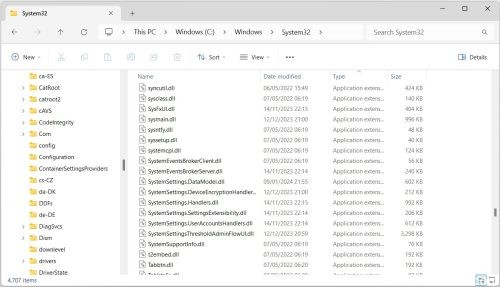
Various online sources indicate that, 2% of people remove this file, so it may be harmless, yet it's advised to personally verify the file's integrity to ascertain whether it is secure or potentially malicious.
Deleting a DLL file such as cui.dll requires caution. DLLs are critical for programs to function, containing essential code that multiple applications might share. Removing a DLL can lead to software malfunctions or system instability.
It's generally unwise to delete a DLL file without confirming its safety or understanding its impact, as DLLs can be distributed across various locations beyond the Program Files directory, complicating their removal.
If you believe cui.dll is unnecessary or harmful, verify its significance first. If in doubt, it's best to leave it be to avoid unintended consequences for other applications. Should you decide to proceed with deletion, back up the file. This step ensures you can restore the DLL if its absence negatively affects other software, maintaining your system's integrity.
Common cui.dll error messages
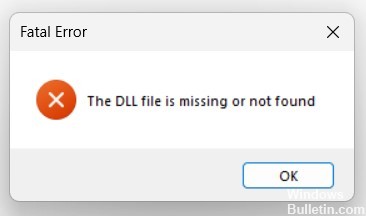
Common error messages related to cui.dll often indicate problems with the DLL file's availability or integrity. These errors can arise in various scenarios, such as when launching software, during software operation, or at system startup. Typical error messages include:
- "The application OpenOffice 4.0.0 failed to start because cui.dll was not found. Re-installing the application may fix this problem."
- "cui.dll Not Found"
- "cui.dll Is Missing"
- "Required DLL cui.dll Not Found"
- "The application or DLL cui.dll is not a valid Windows image."
- "cui.dll is either missing or corrupt."
- "Cannot find cui.dll."
- "Cannot start OpenOffice 4.0.0. A required component is missing: cui.dll. Please install the application again."
These messages typically suggest that the DLL file is either missing, not properly registered, or corrupted. Solutions to these errors may include reinstalling the affected program, restoring the missing DLL file from a backup, or using system tools like System File Checker (SFC) to repair corrupted system files. In some cases, updating drivers for hardware components related to the error may also resolve the issue.
How to fix cui.dll
Updated April 2024:
We recommend you try using this new tool. It fixes a wide range of computer errors, as well as protecting against things like file loss, malware, hardware failures and optimizes your PC for maximum performance. It fixed our PC quicker than doing it manually:
- Step 1 : Download PC Repair & Optimizer Tool (Windows 10, 8, 7, XP, Vista – Microsoft Gold Certified).
- Step 2 : Click “Start Scan” to find Windows registry issues that could be causing PC problems.
- Step 3 : Click “Repair All” to fix all issues.
To resolve issues with a missing or corrupted cui.dll file, which can adversely affect applications and the operating system, follow these steps carefully. Doing so will help ensure your system runs smoothly, allowing you to continue your work and use essential software without interruption.
Run SFC
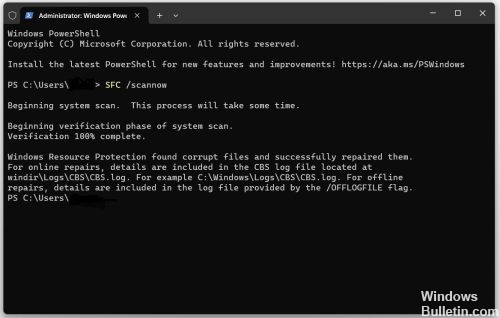
The System File Checker (SFC) tool is built into Windows and is designed to repair corrupted or missing system files, including cui.dll.
- Right-click the Start button and select "Command Prompt (Admin)" or "Windows PowerShell (Admin)" from the menu.
- In the command prompt, type sfc /scannow and press Enter.
- Wait for the scan to complete; this might take around 10 minutes. If SFC finds and fixes any issues, restart your computer. Running this scan in Safe Mode or at startup may yield better results.
Update drivers
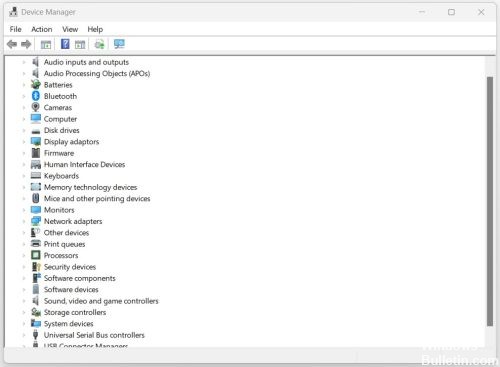
If the cui.dll error occurs while using a specific piece of hardware (e.g., a printer), it could be due to outdated drivers.
- Update your device drivers through the Device Manager in Windows or by visiting the manufacturer's website to download the latest drivers.
Startup repair
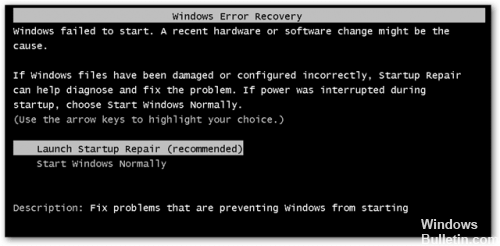
Using Windows Startup Repair can fix DLL files like cui.dll by restoring them to their original state. However, be cautious as this might cause issues with programs that have updated DLL files.
-
Access Advanced Startup: Boot from Windows installation media or recovery drive, select "Repair your computer," then choose "Troubleshoot" > "Advanced options."
-
Select Startup Repair: From the Advanced options menu, click on "Startup Repair" and choose an administrator account if prompted.
-
Complete the Repair Process: Allow Windows to diagnose and fix startup issues automatically, then restart your computer to see if the problem is resolved.
Use Fortect
For an additional layer of protection and to potentially fix the cui.dll error, download and run Fortect. Fortect scans for and repairs issues within your system files, including DLL errors. It can also help identify and resolve related security vulnerabilities, ensuring your system remains stable and secure.
Download or reinstall cui.dll
Downloading or reinstalling cui.dll files from the internet requires caution due to the risk of malware and viruses. Many websites claim to offer quick fixes by providing DLL files, but few are trustworthy, and downloading from unreliable sources can lead to security risks.
Best Practices for Handling Missing DLL Files
- Avoid Downloading from Unverified Websites: Downloading DLL files from random or unverified websites can expose your computer to malware. These sites often don't screen their files for safety, posing a significant risk to your system's security.
- Reinstall the Affected Application: If a specific program is causing the cui.dll error, reinstalling the application may restore the missing or corrupted DLL file to its correct version.
- Use Official Sources: The safest method to replace a missing or corrupted cui.dll file is to obtain it directly from the original software provider or through a system update from Microsoft.
Installing cui.dll
Obtain the DLL File: Secure a clean, updated version of cui.dll from the software provider or official Microsoft sources.
Copy to System Directory: Place the file in C:\Windows\System32 (for 32-bit systems) or C:\Windows\SysWOW64 (for 64-bit systems).
Register the DLL: Open Command Prompt as an administrator and run regsvr32 cui.dll to register the file in the system.
How to register or unregister cui.dll
Registering or unregistering DLL files is a task often required for troubleshooting or ensuring that certain programs function correctly. Here are steps for both processes on a Windows system:
To Register a DLL File:
- Open Command Prompt as Administrator: Press Windows + S, type cmd, right-click on Command Prompt, and select Run as administrator.
- Register the DLL: Type the command
regsvr32 "path\to\your\dllfile.dll"and press Enter. Replace "path\to\your\dllfile.dll" with the actual path and name of the DLL file you wish to register. You should see a confirmation message if the operation is successful.
To Unregister a DLL File:
- Open Command Prompt as Administrator: Press Windows + S, type cmd, right-click on Command Prompt, and select Run as administrator.
- Unregister the DLL: Type the command
regsvr32 /u "path\to\your\dllfile.dll"and press Enter. Replace "path\to\your\dllfile.dll" with the actual path and name of the DLL file you wish to unregister. A confirmation message should appear if the operation is successful.
RECOMMENDED: Click here to troubleshoot Windows errors and optimize system performance
(optional offer for Fortect)
